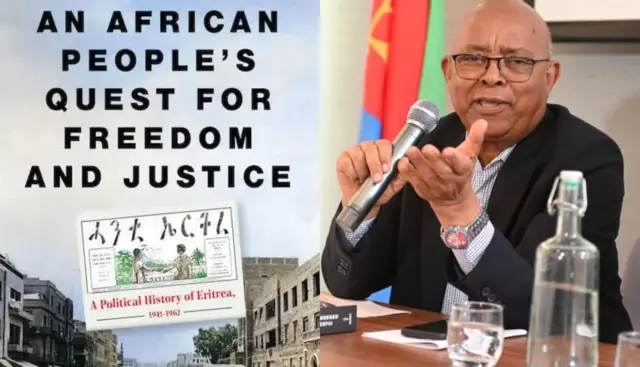Date: Saturday, 03 May 2025

THE EMBASSY of Eritrea in London hosted the launch of An African People’s Quest for Freedom and Justice last month, the latest work by acclaimed historian, lawyer, and Eritrea’s first playwright, Alemseged Tesfai, writes Estelle Uba.
The new historical nonfiction, which is one of Tesfai’s first works to be translated in English, traces the roots of the Eritrean independence struggle from 1941 to 1962, using untapped local sources, including oral histories and original documents. It captures how the people of Eritrea — a country small in size and population — united in spite of religious and ethnic divisions to resist colonialism.
The event drew representatives from Eritrean community organisations, as well as African and Caribbean scholars, diplomats, and members of the press — highlighting the book’s resonance with global audiences concerned with independence and post-colonial identity.
Tesfai, who is celebrated for his contributions to Eritrean literature, said that the book is a source of inspiration for liberation struggles across Africa: “The Eritrean struggle for independence was a very lonely and isolated fight for independence by a very small, disadvantaged people.
“The resilience and determination that went into it is enough of an example to similarly oppressed people who seek freedom and justice.”
Over the past three decades, Tesfai has written historical narratives, novels, plays, and essays. He said that he transitioned from law into writing to fill the gap in literature written by Eritreans themselves: “Eritrean history has for long been written by people who don’t really have a deep knowledge of the fabric of the Eritrean society, without consultation with the people who made that history.”
Yafet Zereou, Head of Diplomatic and Bilateral Relations at the Embassy of the State of Eritrea to the UK and Ireland, said: “For most Eritreans, our approach to our history is often driven by emotion, rather than facts and research. This book acts as a barometer to show how far Eritrea has come.”
Drawing on Nigerian writer Chinua Achebe’s famous proverb, “Until the lions have their historians, tales of the hunt shall always glorify the hunter”, Zereou said: “This book is a voice for Eritreans. It’s the lion writing about the hunt. ”
Ksanet Yohannes, a young British Eritrean attendee, said that, unlike Tesfai’s previous works — many which are written in Tigrinya — An African People’s Quest for Freedom and Justice is translated into English, which makes it more accessible to young Eritreans in the diaspora.
She said: “Most of us have family members who actually sacrificed their life fighting in the Eritrean War of Independence from 1961-91, so we often feel our identity with a deep passion.
But a lot of us don’t actually understand the events that led up to it. Reading the work of historians like Alemseged can really help the younger generation across the diaspora make sense of their identity.”
The significance of An African People’s Quest for Freedom and Justice was felt beyond the Eritrean community, with attendees from a range of other African and Caribbean countries expressing their support.
Uzo Owunne, a Nigerian and Chairman of the African Ambassadors and Diaspora Interactive Form, said that the book underscores the importance of Africans “documenting their history from their own lens and not from the lens of others, for generations to come.”